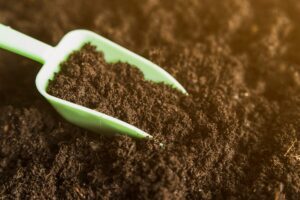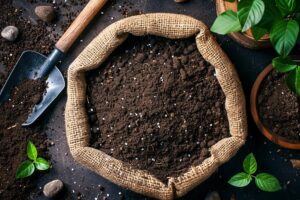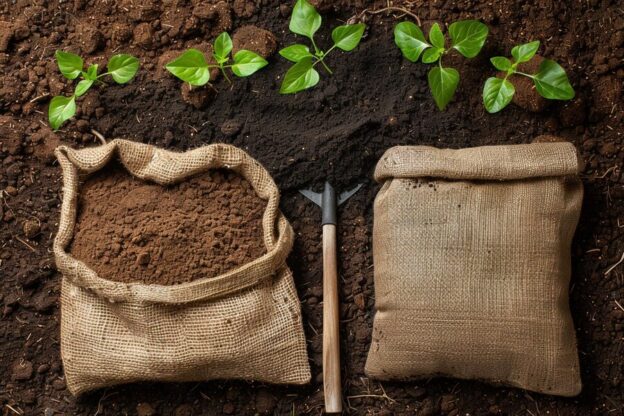Organic alternatives for their plants captivate both environmentalists and gardeners more and more. A chemical-free substitute that not only advances better plants but also helps the environment is organic fertiliser. Creating your homemade organic fertiliser at home may be a fun and fulfilling endeavour providing reasonably priced and environmentally responsible answers for your gardening requirements. Here we go over simple recipes and methods for making your organic fertilizers to enable the success of your garden.

Why Choose Organic Fertiliser?
Using organic fertiliser has many advantages. Organic choices enhance the soil naturally, so promoting long-term soil health, unlike synthetic fertilisers. Additionally, safer for the environment, organic fertilisers lower the possibility of chemical runoff endangering nearby ecosystems. They also give vital nutrients in a slow-release form, so guaranteeing a consistent supply of food over time for your plants. Using organic fertiliser promotes better, more durable plants as well as environmentally friendly gardening methods.
Essential Components for DIY Organic Fertiliser
You must know the three main nutrients plants need— nitrogen, phosphorous, and potassium—if you are to make good organic fertilizer. Phosphorous helps root and flower development; nitrogen encourages foliage growth; potassium improves general plant health and disease resistance. These nutrients abound in many domestic goods and natural resources, which can be recycled into organic fertilizers.
Kitchen waste rich in potassium and nitrogen correspondingly, such as banana peels and coffee grounds, are common components for homemade organic fertilisers. Other excellent sources of calcium are eggshells, which also provide potassium, and wood ash. Thoughtfully blending these ingredients will let you create fertilisers specifically for your plants.
Easy DIY Organic Fertiliser Recipes
1. Compost Tea
Steeping compost in water creates a nutrient-dense beverage called compost tea. To make it, toss a shovelful of compost into a cloth bag or mesh, then soak it in a basin of water for 24 to 48 hours. Stir periodically to release nutrients. Once ready, 1:10 ratio dilute the liquid with water then apply it to the roots or foliage of your plants. Excellent organic fertiliser, compost tea provides a balanced combination of nutrients and helpful bacteria.

2.Banana Peel Fertiliser
Potassium, a key element for plants, is abound in banana peels. Chop up several banana peels and soak them in water for a few days to make a fertilizer. Filter the liquid then water your plants with it. For a slow-release effect, you might alternatively bury banana peels straight into the ground close to your plants. For fruit trees and floral plants especially, this organic fertilizer is quite successful.
3. Eggshell Powder
Strong cell walls in plants depend on calcium, which eggshells provide rather well. After rinsing and drying your eggshells, ground them fine either with mortar and pestle or blender. Either mix the powder into the ground or scatter it over the base of your plants. For tomato, pepper, and other calcium-loving crops, eggshell powder performs effectively as an organic fertiliser.
4. Grass Clipping Fertiliser
Rich in nitrogen, grass clippings would be ideal for your plants. Lay a thin layer of clippings around your plants as mulch to make organic lawn fertilizer. The nutrients released from the grass break down into the ground. Steer clear of piling the clippings too densely since this could build a barrier keeping air and water from getting to the roots.
5. Coffee Grounds Fertiliser
Another great supply of nitrogen is used in coffee grounds. They also draw earthworms, which aerate the ground and serve to strengthen its structure. Either put coffee grounds into your compost or gently sprinkle them around your plants to use as an organic fertiliser. Steer clear of overusing coffee grinds as, in excessive doses, they can turn the soil overly acidic.

Using Organic Grass Fertilizer for Lawns
Many homeowners take great delight in a rich, verdant lawn. Making your organic grass fertilizer can help you reach this without depending on synthetic compounds. Combining molasses, compost, and liquid seaweed with water makes a basic recipe. To encourage good development and improve the soil, equally distribute this mixture over your grass. Apart from feeding the grass, the organic grass fertilizer promotes a strong ecology on your lawn with earthworms and helpful bacteria.
Tips for Successful Application
Using organic fertiliser calls for timing and technique that are absolutely vital. Fertilisers should be used throughout the growing season when plants are most nutrient-absorbing. Steer clear of overfertilizing since extra nutrients could damage plants and leak into groundwaters. Water your plants following fertiliser application to enable nutrients to efficiently reach the roots from the soil.
The track also the reaction of your plants to the fertiliser. While delayed development could point to a shortage of phosphorous or potassium, yellowing leaves could point to a nitrogen shortfall. Change the makeup of your fertiliser to suit these problems.
Sustainable Gardening Practices
One element of environmentally friendly gardening is including organic fertiliser in your schedule. Think about combining your efforts at fertilisation with other environmentally friendly techniques such as companion planting, crop rotation, and rainwater collecting. These techniques interact to produce a self-sustaining, balanced garden environment.
Conclusion
Making and applying homemade organic fertiliser is a straightforward but effective approach to improving your garden and helping environmental sustainability. From organic grass fertilizer for lawns to compost tea and banana peel fertilizer, these handcrafted remedies provide reasonably priced and successful substitutes for synthetic items. Using organic fertiliser helps you not only produce better plants but also helps to preserve the earth. Regardless of your level of experience with gardening, these simple ideas and methods will enable you to create a vibrant, sustainable garden.








